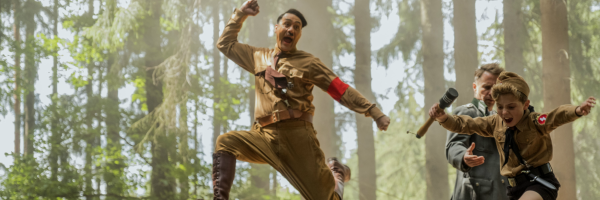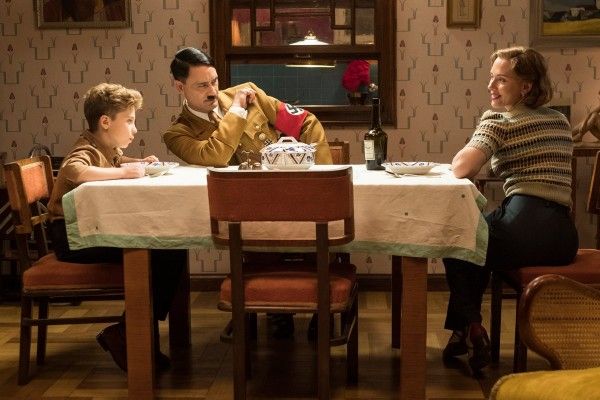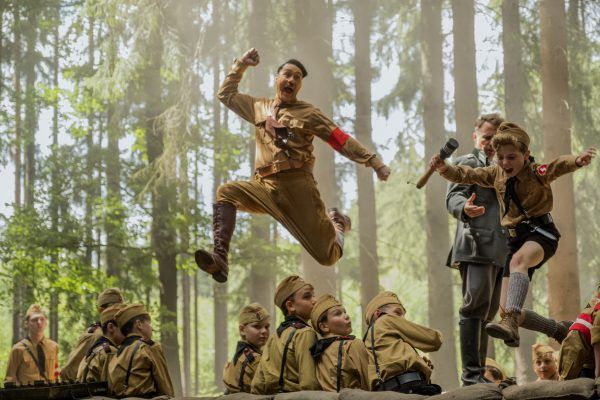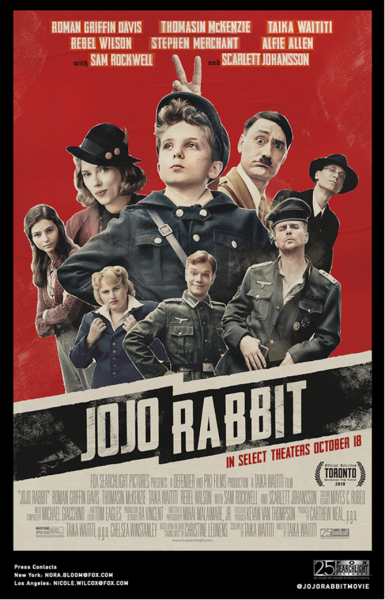Movies about fascism tend not to be crowd-pleasers. When Nazis show up, you’re supposed to take things seriously unless it’s an episode of Hogan’s Heroes. But because fascists rely so much on their own perceived heroism and glory, one of the best things you can do is laugh at them and how small they are. Taika Waititi understands the power of comedy and love over hate, and had made that lesson easily accessible in the hilarious and sweet Jojo Rabbit. Backed by a fantastic cast and two amazing lead performances from young actors Roman Griffin Davis and Thomasin McKenzie, you’ll be laughing throughout and yet Waititi never loses sight of the importance of love. The film excels at making Nazis small because it’s got such a big heart.
Jojo (Davis) is a Hitler Youth in the waning years of World War II. He’s infatuated with Nazis and Hitler like regular kids are infatuated with superheroes or athletes and he’s such a fan that his imaginary best friend is Adolf Hitler (Waititi). After accidentally blowing himself up with a grenade during a weekend away at Nazi camp, Jojo gets stuck at home with his mother Rosie (Scarlett Johansson) doing menial tasks for the Reich. However, while at home one day he discovers that his home is harboring Elsa (McKenzie), a young woman who’s also Jewish. At first, Jojo views her with suspicion and only avoids reporting her because he’s afraid he and his mother will be held accountable. He then starts talking more with Elsa to “learn” about Jews (she’s more than happy to mislead him), and soon a bond begins to form, much to the consternation of Imaginary Hitler.
It may seem like a weak, obvious message for a movie in 2019 to say, “Fascism is bad and its followers are overgrown children,” but authoritarianism is catching on worldwide. Demographics are changing, people are emigrating, income inequality is growing, and that leaves a space for fascists to talk about some glorious destiny that will be achieved if only we can exterminate some minority. A kid can hop on YouTube and get a lecture from a white nationalist, so why not fight back with a well-crafted, utterly delightful comedy? If you leave the space open, fascists will come to fill it, so you can’t give them any ground. And wisely, rather than taking fascists on directly and treating them as equals in the vaunted “marketplace of ideas”, Waititi just mocks the shit out of them.
Although I greatly enjoyed Waititi’s previous movie, Thor: Ragnarok, I felt at times that he was running past the emotional impact to get to the next joke. Jojo Rabbit is also jam-packed with humor (for example there’s an A+ throwaway gag referencing The Boys from Brazil), but it never loses sight of the emotional stakes. When Rosie and Jojo walk through the public square and see people who have been hung for treason, the movie knows that it’s not time for a witty one-liner. When Jojo and Elsa are starting to connect, the movie embraces that moment as Jojo’s feelings for her start to emerge. Letting these emotional beats have their moment makes Jojo Rabbit a richer film where it’s not just about dunking on Nazis (although that’s always fun), but one about why love and friendship are so vital. Waititi’s not interested in showing why hate is appealing; he wants to show why it will always be small and silly compared to our better nature.
This theme comes through loud and clear thanks not only to his skillful direction, but his two talented leads. McKenzie broke out last year with her excellent performance in Leave No Trace, and she shines again here as Elsa. Although the film is showered in anachronistic behavior, we believe in Elsa’s strength balanced against her vulnerability. McKenzie gives the character a credibility so that we don’t think she’s some 2019 teenager who ended up in Nazi Germany, but she can also mock Jojo and his wrongheaded ideas about Jews. As for Jojo, Waititi has made yet another great discovery (he already did it once with Julian Dennison and Hunt for the Wilderpeople). Finding young, untested actors is no easy feat, but Davis is perfect, showing the character’s innocence, affection, and pain. The entire film hinges on these two performances, and while he and McKenzie are surrounded by talented veterans like Johansson and Sam Rockwell, it’s these two relative newcomers excel at delivering the comedy and pathos required of them.
Jojo Rabbit is PG-13 and it’s absolutely the kind of film young viewers should see. Some parents may worry that it’s too violent (it’s not really) or too irreverent, but kids should learn why fascism is both harmful and ridiculous. Those two ideas may seem opposed, but Jojo Rabbit shows that they’re not. The solution (although certainly not the only solution) is to belittle harmful ideologies and uplift positive values. And if you can do it in a movie that’s as funny and sweet as Jojo Rabbit, then all the better.
Rating: B+
Jojo Rabbit opens October 18th




